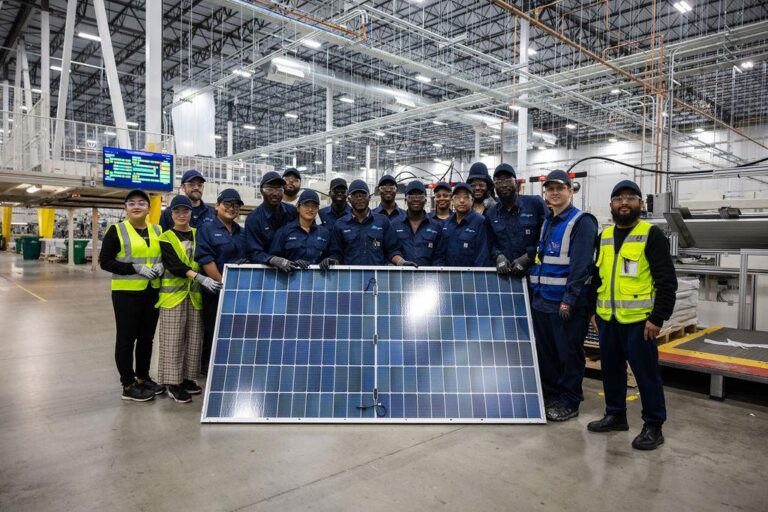The solar industry is raising alarms over a proposed Senate plan, warning it risks ceding critical clean energy production to China. As the U.S. seeks to expand its domestic manufacturing of solar technologies, industry leaders argue the legislative approach falls short of safeguarding American competitiveness in a sector pivotal to the nation’s clean energy future. The debate highlights ongoing tensions over trade, industrial policy, and national security amid a global race to dominate renewable energy markets.
Solar Industry Warns Senate Plan Risks Strengthening China’s Market Dominance
Industry leaders are raising alarms over a Senate proposal that they argue could inadvertently accelerate China’s predominance in the global solar market.According to industry experts, the plan’s emphasis on certain subsidies and incentives lacks critical safeguards necessary to sustain American manufacturing. Without targeted measures to bolster domestic production capacity,the U.S. risks becoming heavily reliant on Chinese-made solar components, undermining national energy security and job growth.
Key criticisms of the Senate plan include:
- Insufficient investment in U.S. manufacturing infrastructure
- Lack of enforceable mechanisms to prevent supply chain outsourcing
- Potential long-term erosion of competitiveness in clean energy sectors
| Factor | Senate Plan | Industry Recommendation |
|---|---|---|
| Manufacturing Incentives | General tax credits | Targeted grants supporting U.S. factories |
| Supply Chain Security | Minimal protections | Rigorous domestic sourcing requirements |
| Export Controls | Not addressed | Enhanced regulations to curb tariff circumvention |
Industry Leaders Detail Potential Impact on Domestic Manufacturing and Jobs
Leading executives in the solar sector warn that the Senate’s current legislative framework risks undermining decades of progress in domestic manufacturing. By omitting crucial incentives for U.S.-based production facilities, the plan could inadvertently bolster China’s dominance in the solar supply chain, experts say. Stakeholders are especially concerned that this shift threatens to erode the jobs that have been steadily growing in communities reliant on clean energy industries.
Industry leaders emphasize that without targeted policy measures, the U.S. is poised to lose ground in:
- Manufacturing of photovoltaic components
- Supply chain innovation and resilience
- High-wage employment opportunities in renewable energy
This shift could reshape the economic landscape of key states with emerging solar hubs, as outlined in the table below.
| State | Current Solar Jobs | Potential Job Loss (%) | Manufacturing Plants |
|---|---|---|---|
| Arizona | 12,000 | 15% | 8 |
| Texas | 9,500 | 12% | 5 |
| Georgia | 7,800 | 18% | 6 |
| North Carolina | 10,200 | 14% | 7 |
Economic and Security Concerns Drive Calls for Revised Policy Approach
Industry leaders and policy experts are voicing significant apprehensions regarding the current trajectory of the Senate’s solar production incentives. The proposed framework, they argue, inadvertently undermines domestic manufacturing capabilities by prioritizing certain production methods that heavily favor imported components, particularly from China. This dependency raises alarms not only about economic competitiveness but also national security, as critical supply chains become vulnerable to geopolitical tensions and trade disruptions.
Analysts emphasize that a strategic pivot in policy design is essential to safeguard American interests. Rather than merely incentivizing solar adoption, the proposal should:
- Support the growth of local manufacturing ecosystems
- Enhance technological innovation in solar components domestically
- Mitigate risks posed by overreliance on foreign supply chains
Failure to address these issues could lead to a scenario where the U.S. cedes its leadership position in renewable energy production to global competitors, notably China, which already dominates significant portions of the solar industry supply chain.
| Factor | Impact on US Solar Industry | Proposed Change |
|---|---|---|
| Component Sourcing | Heavy reliance on imports | Incentives for domestic parts manufacturing |
| Supply Chain Security | Vulnerability to disruptions | Diversification and local production boost |
| Innovation Capacity | Lagging behind competitors | Increased R&D funding |
Experts Recommend Strengthening Incentives for US Solar Production
Industry leaders and energy policy experts are urging lawmakers to enhance economic incentives that bolster domestic solar manufacturing. Current proposals fall short of creating a competitive habitat against the rapidly expanding Chinese solar sector, which dominates global production with substantial government backing. By strengthening incentives, advocates argue the U.S. could reclaim its manufacturing edge, generate jobs, and ensure a more resilient supply chain for solar components.
Key recommendations include:
- Increased tax credits specifically targeted at American solar module and component manufacturers
- Direct grants and subsidies to stimulate innovation and scale production facilities domestically
- Enhanced trade enforcement measures to curb unfair import practices and strengthen industry protections
| Incentive Type | Impact |
|---|---|
| Tax Credits for Solar Manufacturing | +30% production growth |
| R&D Grants | Accelerated technology advancements |
| Trade Protection Measures | Reduced import dependence |
To Wrap It Up
As the Senate moves forward with its plan, industry leaders warn that the proposed measures could inadvertently hand over critical manufacturing capabilities to China, possibly undermining U.S. ambitions for energy independence and economic leadership in the solar sector. Stakeholders continue to call for adjustments that would bolster domestic production while addressing global supply chain challenges. The unfolding debate highlights the complex balance policymakers must strike between fostering innovation,protecting national interests,and advancing renewable energy goals.




